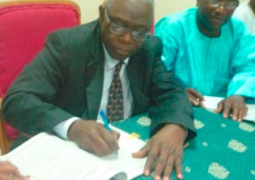Last week Gambia became the first African nation to recognize Libya’s Transitional National Council as the legitimate representative of the Libyan people. Simultaneously, Gambian authorities froze Moammar Gadhafi’s investments in their country while denouncing his human rights abuses. This development is largely symbolic, but meaningful nonetheless. Tiny Gambia has long been one of Gadhafi’s closest allies in West Africa. Since his rise to power in 1994, Gambian President Yahya Jammeh has looked to Gadhafi as a benefactor and mentor, even claiming inspiration from Gadhafi’s Green Book.
If Gambia can switch its allegiance to a rebel-led Libya, why are others on the continent so reluctant to do so? One reason is that Gadhafi’s ouster would mean a major shift in Libya’s strategic and financial relationships with sub-Saharan Africa. Gadhafi represents a Libya that has distributed its patronage southward over the last 20 years, while the rebels would almost certainly turn their attention and future petrol dollars to the north and east. Additionally, many of Africa’s strongmen fear encouraging a precedent that could lead to uprisings and international intervention in their own countries. Others are justifiably hesitant to take an overtly anti-Gadhafi stance while their own migrant workers are essentially trapped in Libya. To be more respected in the world, the African Union must first escape Gadhafi’s shadow.
Therefore, most of the African Union’s member states would be risking certain short-term interests in recognizing the Libyan rebels. But they would also be taking a step towards the long-term payoff of ending Gadhafi’s meddling in their societies, and bringing the AU greater legitimacy in diplomatic circles. This helps explain the murky “neutrality” that the AU has sought to project regarding Libya. Its mediation mission to Tripoli this month docilely fulfilled Gadhafi’s bidding, casting him as a “man of peace” while attempting to portray the rebels as warmongers by deliberately offering them a “peace plan” they could not accept.
This was all the more disappointing after the AU’s dramatic falling-out with Gadhafi in January 2010, when the Libyan leader attempted to run for an unprecedented second term as AU president. That, followed by the events of the last few months, led some observers to expect that the AU was finally ripe to overcome its members’ divergent interests and make an emphatic anti-Gadhafi turn. But its “mediation” in Libya earlier this month only underscored the AU’s impotence. It appears that the AU delegation did not even decide to intervene until it was invited by Gadhafi. The AU delegates then fulfilled the role he assigned them, proclaiming that Gadhafi had accepted their “road map” to peace before they even presented it to the rebel side.
Particularly puzzling was South Africa’s involvement in this charade. Although Gadhafi’s support for Nelson Mandela and the African National Congress was essential to their success in the 1990s, South African President Jacob Zuma cannot be described as a Gadhafi stooge. South Africa voted in favor of the UN Security Council Resolution that called for a humanitarian no-fly zone in Libya. That Mr Zuma left the AU mission prior to its conclusion may show that he realized that the mediation would come to naught, and didn’t want to be overly associated with its failure.
Yesterday the AU initiated a new round of talks in Addis Ababa, promising to meet with both rebel and regime representatives, and to try and bridge their demands. The AU’s track record in conflict resolution from the Ivory Coast to Madagascar to Somalia- has not been promising so far. Nonetheless, the AU could conceivably make a real breakthrough in Libya, particularly if it would leverage its institutional connections to mediate an exile arrangement for Gadhafi and his family.
Before that can happen though, more African states would need to publicly call for Gadhafi to go, and follow the Gambian example by recognizing the rebels. South Africa could play a key role in this process by hardening its stance on Gadhafi and attempting to rally other potentially receptive African nations, such as Nigeria and Gabon, both of which also voted in favor of the UN no-fly zone in Libya.
The upheavals in Libya and across North Africa represent a golden opportunity for the AU to inaugurate a new era of institutional clout. The Arab League’s early calls for a no-fly zone breathed new life into that once-moribund organization. Both Africa and the world would benefit from a more internationally respected AU that could advocate for Africa on issues ranging from agricultural subsidies to peacekeeping. But for the AU to find a new role on the world stage, it must first decisively escape Gadhafi’s long shadow.
Mr Pack researches Libya at St. Anthony’s College, Oxford University
Culled from the Wall Street Journal



